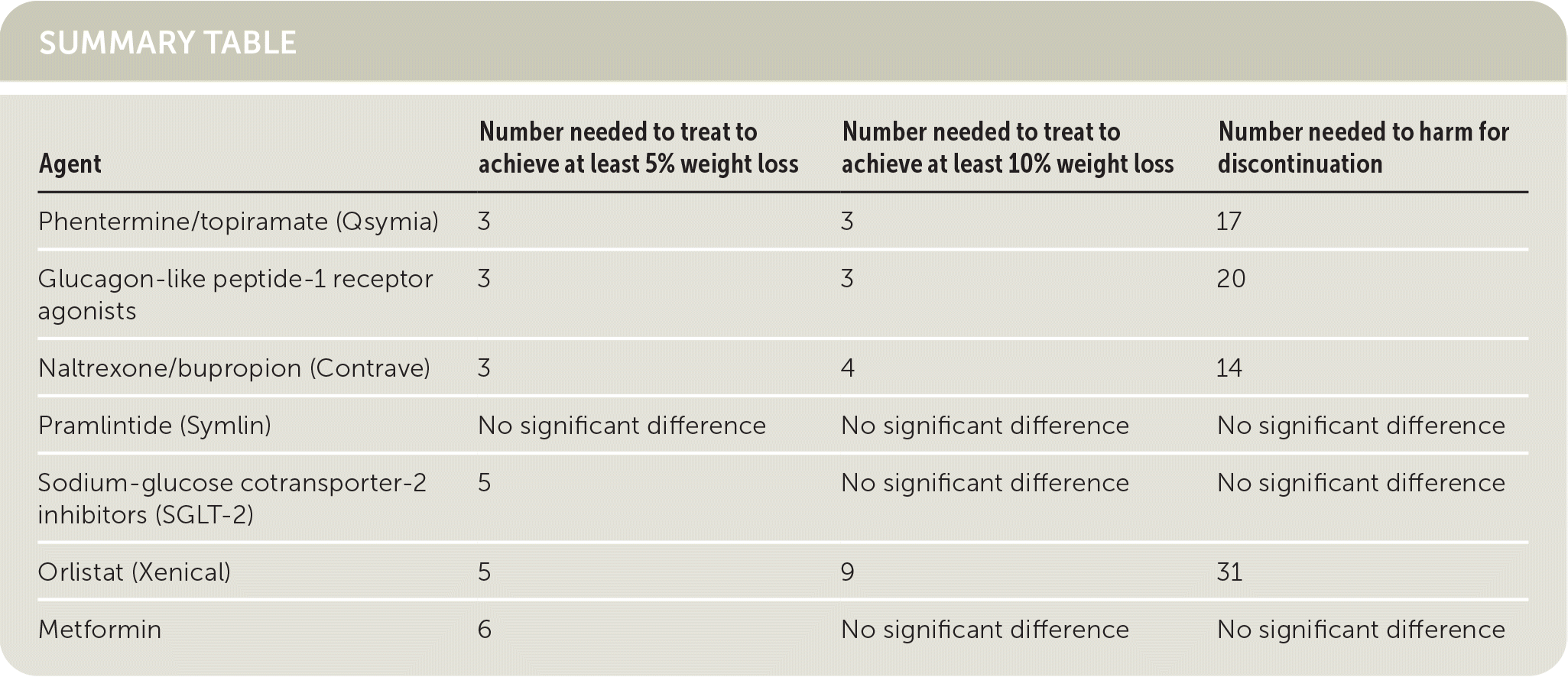
Am Fam Physician. 2022;106(1):online
Clinical Question
Are any medications effective for weight loss and improving health in adults who are obese or overweight?
Bottom Line
Several medications are more effective than lifestyle modification in achieving short-term weight loss at the expense of adverse events. Although quality of life scores are improved, it is unclear if weight loss with medication results in fewer adverse health events. (Level of Evidence = 1a−)
Synopsis
The authors searched PubMed, EMBASE, the Cochrane Library, and ClinicalTrials.gov to identify randomized trials of various medications that promote weight loss in adults who are overweight or obese. The included trials did not have to include people with comorbid conditions but had to compare a medication with lifestyle modification with or without a placebo. The studies had to report weight loss–related data and quality of life scores but did not have to report other health outcomes (e.g., gastrointestinal symptoms, body image, changes in blood pressure, changes in laboratory parameters such as glycated hemoglobin, lipid levels). The authors also accepted data that were not necessarily analyzed by intention to treat. They included 143 unique trials with 49,810 participants, 75% of whom were women. The median length of the trials was 24 weeks. The authors identified a high risk of bias due to protocol deviations and missing outcome data, and they had concerns about how adverse events were assessed. They decided to perform a network meta-analysis. They found that phentermine/topiramate (Qsymia) was the most effective medication for achieving at least a 5% weight loss (odds ratio [OR] = 8.02; 95% CI, 5.24 to 12.27), followed by glucagon-like peptide-1 (GLP-1) receptor agonists (OR = 6.33; 95% CI, 5 to 8). The order of effectiveness in achieving at least a 10% weight loss was the same. Although effective in achieving weight loss, most drugs had significant discontinuation rates due to adverse events: naltrexone/bupropion (Contrave; OR = 2.69; 95% CI, 2.11 to 3.43), phentermine/topiramate (OR = 2.40; 95% CI, 1.69 to 3.42), GLP-1 receptor agonists (OR = 2.17; 95% CI, 1.71 to 2.77), and orlistat (Xenical; OR = 1.72; 95% CI, 1.44 to 2.05). Quality of life scores improved to a greater degree for phentermine/topiramate (standardized mean difference [SMD] = 0.42), followed by naltrexone/bupropion (SMD = 0.36), and GLP-1 receptor agonists (SMD = 0.29). The authors reported that compared with lifestyle modification, medications caused greater degrees of lower glycated hemoglobin and lipid levels but not systolic blood pressure. For most of the data, the authors report significant heterogeneity. They do not report on other important outcomes, such as mortality, cardiac events, development or regression of diabetes, and so forth.

| Agent | Number needed to treat to achieve at least 5% weight loss | Number needed to treat to achieve at least 10% weight loss | Number needed to harm for discontinuation |
|---|---|---|---|
| Phentermine/topiramate (Qsymia) | 3 | 3 | 17 |
| Glucagon-like peptide-1 receptor agonists | 3 | 3 | 20 |
| Naltrexone/bupropion (Contrave) | 3 | 4 | 14 |
| Pramlintide (Symlin) | No significant difference | No significant difference | No significant difference |
| Sodium-glucose cotransporter-2 inhibitors (SGLT-2) | 5 | No significant difference | No significant difference |
| Orlistat (Xenical) | 5 | 9 | 31 |
| Metformin | 6 | No significant difference | No significant difference |
Study design: Meta-analysis (randomized controlled trials)
Funding source: Foundation
Setting: Various (meta-analysis)
Reference: Shi Q, Wang Y, Hao Q, et al. Pharmacotherapy for adults with overweight and obesity: a systematic review and network meta-analysis of randomised controlled trials. Lancet. 2022;399(10321):259-269.
